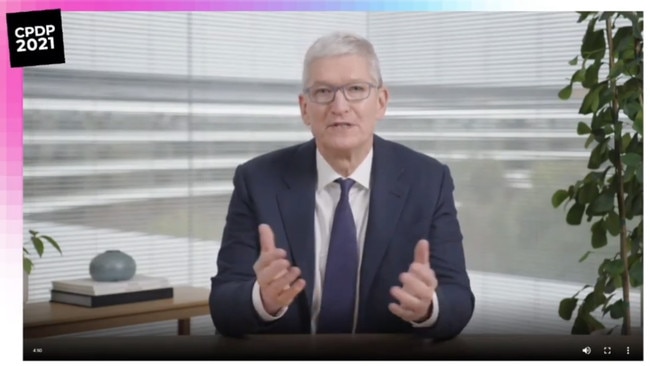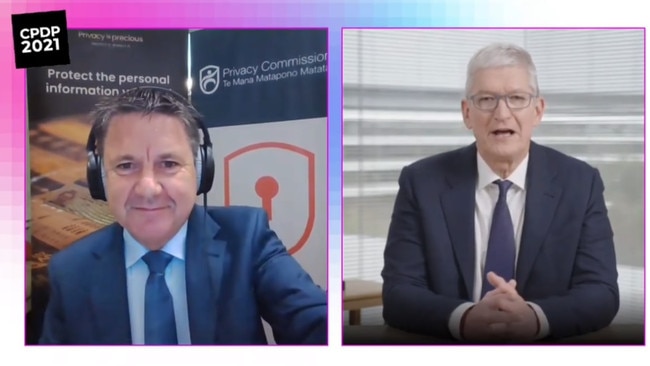Apple CEO Tim Cook’s privacy speech is cold comfort for Facebook
CEO Tim Cook has locked-in Apple’s determination to take on Facebook’s ad tracking in a rousing speech that warns we risk losing the freedom to be human.

CEO Tim Cook has locked-in Apple’s determination to take on Facebook’s ad tracking in a passionate speech that warns we risk losing the freedom to be human.
From around the Australian autumn, Apple iPhone users will have to explicitly give developers permission to track their activities on mobile devices and garner information about them for advertisers.
Tracking users has been the lifeline for Facebook whose entire business model depends on the current opt-out model, where the world’s phone users are automatically tracked unless they bother to opt out of being tracked, and relatively few do.
It’s little wonder that Facebook CEO Mark Zuckerberg is reeling at the prospect of Facebook missing out knowing a lot about Apple users’ activities. With the change, Facebook’s business model is thrown into jeopardy if it cannot track users with the accuracy it needs for targeted advertising.
Mr Zuckerberg this week branded Apple as increasingly one of his company’s biggest competitors and said the privacy move would hurt small business, however it’s Facebook itself that stands to lose out by not being able to automatically track users on Apple devices without their permission.
Speaking early today as part of the European Union data protection conference hosted from Brussels, Mr Cook’s speech was broader than the privacy concerns of user tracking.
“The fact is that an interconnected ecosystem of companies and data brokers, of purveyors of fake news and peddlers of division, of trackers and hucksters just looking to make a quick buck, is more present in our lives than it has ever been,” he said.
“And it has never been so clear how it degrades our fundamental right to privacy first, and our social fabric by consequence.”
But his determination indicates there is no turning back for Apple in implementing its opt-in privacy measures, which requires users to give explicit permission for developers to track them, and not be tracked automatically.
He said the world must send a universal, humanistic response to those who claim a right to users’ private information about what should not and will not be tolerated.
“As I’ve said before – if we accept as normal and unavoidable that everything in our lives can be aggregated and sold, then we lose so much more than data. We lose the freedom to be human,” he told the conference.
“As I said in Brussels two years ago, it is certainly time, not only for a comprehensive privacy law here in the United States, but also for worldwide laws and new international agreements that enshrine the principles of data minimisation, user knowledge, user access and data security across the globe.
“We’ve set new industry standards for data minimisation, user control and on-device processing for everything from location data to your contacts and photos.
“Together, we must send a universal, humanistic response to those who claim a right to users’ private information about what should not and will not be tolerated.”

He said Apple was deploying “powerful, new requirements to advance user privacy throughout the App Store ecosystem”.
“The first is a simple but revolutionary idea that we call the privacy nutrition label. Every app — including our own — must share their data collection and privacy practices, information that the App Store presents in a way every user can understand and act on.
“The second is called App Tracking Transparency. Users have asked for this feature for a long time. We have worked closely with developers to give them the time and resources to implement it. And we’re passionate about it because we think it has the great potential to make things better for everybody.
“Earlier today, we released a new paper called “A Day in the Life of Your Data.” It tells the story of how apps that we use every day contain an average of six trackers. This code often exists to surveil and identify users across apps, watching and recording their behaviour.
“Right now, users may not know whether the apps they use to pass the time, to check in with their friends, or to find a place to eat, may in fact be passing on information about the photos they‘ve taken, the people in their contact list, or location data that reflects where they eat, sleep or pray.
“As the paper shows, it seems that no piece of information is too private or personal to be surveilled, monetised, and aggregated into a 360-degree view of your life. The end result of all of this is that you are no longer the customer, you‘re the product.
“Some may well think that sharing this degree of information is worth it for more targeted ads. Many others, I suspect, will not, just as most appreciated it when we built a similar functionality into Safari limiting web trackers several years ago.
“We see developing these kinds of privacy-centric features and innovations as a core responsibility of our work. We always have, we always will.
Mr Cook said technology did not need “vast troves of personal data, stitched together across dozens of websites and apps, in order to succeed”.
“ Advertising existed and thrived for decades without it. And we’re here today because the path of least resistance is rarely the path of wisdom.
“If a business is built on misleading users, on data exploitation, on choices that are no choices at all, then it does not deserve our praise. It deserves reform.”
The Apple chief also addressed contemporary issues such as misinformation and conspiracy theories that have raged during the pandemic and US election campaign.
“At a moment of rampant disinformation and conspiracy theories juiced by algorithms, we can no longer turn a blind eye to a theory of technology that says all engagement is good engagement — the longer the better — and all with the goal of collecting as much data as possible.
“Too many are still asking the question, ‘how much can we get away with?,’ when they need to be asking, “what are the consequences?”
“What are the consequences of prioritising conspiracy theories and violent incitement simply because of their high rates of engagement? What are the consequences of not just tolerating, but rewarding content that undermines public trust in lifesaving vaccinations?
“What are the consequences of seeing thousands of users join extremist groups, and then perpetuating an algorithm that recommends even more? It is long past time to stop pretending that this approach doesn’t come with a cost — of polarisation, of lost trust and, yes, of violence.”
He said a social dilemma cannot be allowed to become a social catastrophe.
“I think the past year, and certainly recent events, have brought home the risk of this for all of us — as a society, and as individuals as much as anything else.
“Long hours spent cooped up at home, the challenge of keeping kids learning when schools are closed, the worry and uncertainty about what the future would hold, all of these things threw into sharp relief how technology can help — and how it can be used to harm.
Will the future belong to the innovations that make our lives better, more fulfilled and more human? Or will it belong to those tools that prize our attention to the exclusion of everything else, compounding our fears and aggregating extremism, to serve ever-more-invasively-targeted ads over all other ambitions?”
“Call us naive. But we still believe that technology made by people, for people, and with people’s wellbeing in mind, is too valuable a tool to abandon.”
He also said humans are not perfect and we make mistakes.
One dilemma for Apple going down this road is its deal with Google over search. It is reported that Google pays Apple up to $US12bn ($15.6bn) annually for being the default search engine on Apple devices. Google doesn’t make this payment out of kindness, it’s vital for Google to know what Apple users are up to on iOS devices.
However the passion in Mr Cook’s speech today will be no comfort for Facebook whose entire advertising business exists on the assumption that users will either not care or not know how to opt out of its ad tracking. That has big consequences for the social media giant.



To join the conversation, please log in. Don't have an account? Register
Join the conversation, you are commenting as Logout